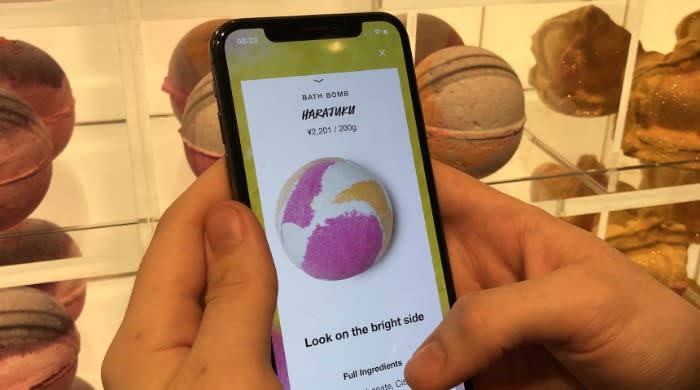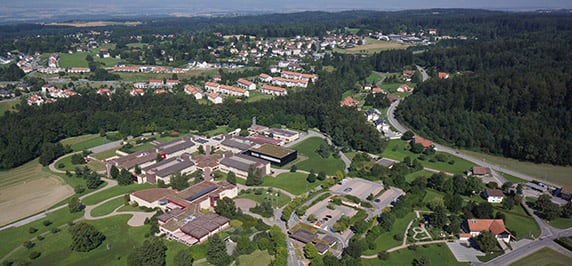Lush’s first ‘Naked’ shop opens in the UK
Today, the Lush shop at 10 Market Street in Manchester opened its doors
again after being renovated into the first plastic packaging-free cosmetics shop
in the country.
Lush’s newest Naked shop — which follows the success of the company’s
first Naked shops in Milan and
Berlin
— offers an abundance of plastic-free alternatives to your favorite
cosmetics — from Lush classics such as solid shampoo bars and soaps, to new
naked skincare innovations. Naked products make up almost 50 percent of
Lush's core range.
Since Lush’s first naked shops opened in late 2018, solid shampoo bars have been
their most popular products — with almost 8,000 sold. That’s up to 616,880
hair washes that haven’t come from plastic bottles!
“In Lush, we work in an industry where the packaging costs the customer more
than the product,” said Lush co-founder and Managing Director Mark Constantine
OBE. “Now, the customer needs to worry about how to recycle something they
didn’t want to buy in the first place. This seems like a raw deal to us. If we
can cut out all the plastic packaging, we can give our customers better value
for money.”
Lush has been working on reducing packaging for years; the company says the new
Naked shop is an exploration into pushing things further. And, rather than
scanning labels for information, visitors to the shop will instead be able to
scan products directly using the recently launched #LushLabs app, replacing
packaging with a digital solution. **Lush Lens **is an in-development experiment
feature that enables Lush to reduce their impact on the environment by using the
phone's camera and Machine Learning to recognise products and give detailed
ingredient information and ‘how to use’ demonstrations via the app.

Naked stats
In 2018, Lush customers in the UK …
-
saved 1.8 million* bottles of plastic bath products by choosing naked Bath
Bombs, Bubble Bars or Bath Melts instead
-
had around 89.8 million** plastic-free hair washes using naked Shampoo
Bars
*based on 7 baths from one 500ml bottle of bubble bath
**based on 60 washes from each shampoo bar
Marks & Spencer trials plastic-free produce

This week, Marks & Spencer put a dent in the amount of its own plastic by
trialing over 90 lines of loose fruit and vegetables completely free of plastic
packaging at its Tolworth store.
To support the trial, M&S has introduced trained greengrocers, who will be on
hand to offer customers advice as they select from two plastic-free aisles of
fruit and vegetables. The range not only includes hard fruit and veg such as
potatoes and bananas, but also more perishable/squishable items such as tomatoes
and berries, which will be sold in compostable baskets.
In addition to helping customers pick and weigh their products, the greengrocers
will provide tips on how best to preserve fresh produce and prevent food waste
at home, as M&S has removed “best before” date labels from fresh produce as part
of the trial.
Alongside the initiatives at Tolworth, M&S has committed to launching additional
lines of loose produce and more sustainable alternatives to plastic in every UK
store, which could save 580 tonnes of plastic waste over two years alone. The
plan will involve replacing plastic produce bags with paper ones and phasing out
plastic barcode stickers in favour of eco-friendly alternatives.
Louise Nicholls, Head of Food Sustainability, said: “We’re proud to launch a
series of market-leading initiatives to help our customers take home less
plastic. We know our customers want to play their part in cutting out plastic,
while as a business our goal is to become zero-waste by 2025. That’s why we’re
working hard to reduce the amount of plastic packaging we use without
compromising on food quality and contributing to waste.
“Our trial at Tolworth is an important milestone in our plastic-reduction
journey, and bringing back the traditional greengrocer will play a key part in
educating our customers. Our plan is to create long-term impact in the future,
using tangible insights from the Tolworth store trial.”
The three-month trial at Tolworth will be the springboard for M&S’s long-term
plastic-reduction strategy, providing insights and customer feedback for an
effective approach across all stores.
The initiative supports M&S’s target of becoming a zero-waste business by 2025.
The retailer has already phased out 75 million pieces of plastic cutlery given
out in its stores each year and replaced two million straws with paper
alternatives as part of its plastics plan, which aims to remove 1,000 tonnes of
plastic packaging by Spring 2019. All of M&S’s packaging will be ‘widely
recycled’ by 2022 in a bid to help customers to recycle more.
Nestlé announces three-pronged approach to driving waste-free future

Meanwhile, Nestlé announced a
series of specific actions towards meeting its April
2018 commitment to
make 100 percent of its packaging recyclable or reusable by 2025, with a
particular focus on avoiding plastic waste.
CEO Mark Schneider said: "Our broader vision and action plan outline our
commitment and specific approach to addressing the plastics packaging waste
issue. While we are committed to pursuing recycling options where feasible, we
know that 100 percent recyclability is not enough to successfully tackle the
plastics waste crisis. We need to push the boundaries and do more. We are
determined to look at every option to solve this complex challenge and embrace
multiple solutions that can have an impact now. We believe in the value of
recyclable and compostable, paper-based materials and biodegradable polymers, in
particular where recycling infrastructure does not exist.
“Collective action is vital, which is why we are also engaging consumers,
business partners and all of our Nestlé colleagues to play their part. You can
count on us to be a leader in this space!"
Addressing the multifaceted issue of plastic pollution requires a holistic view
and a well-orchestrated effort. To this end, Nestlé announced tangible steps to
pioneer alternative materials, shape a waste-free future and drive
behavior change.
Pioneering alternative materials
In December 2018, Nestlé announced the creation of its Institute of Packaging
Sciences (IPS)
to evaluate and develop various sustainable packaging materials and to
collaborate with industrial partners to develop new packaging materials and
solutions.
Between 2020 and 2025, Nestlé will phase
out
all plastics that are not recyclable or are hard to recycle for all its products
worldwide. In doing so, Nestlé is rolling out alternative packaging materials
across its global product portfolio and establishing partnerships with
cutting-edge packaging specialists:
-
Starting in February 2019, Nestlé will begin to eliminate all plastic
straws
from its products, using alternative materials such as paper, as well as
innovative designs to reduce littering.
-
Nestlé will start rolling out paper packaging for Nesquik in the first
quarter of 2019 and for the Yes! snack bar in the second half of 2019.
Smarties will start rolling out plastic-free packaging in 2019
and Milo will introduce paper-based pouches in 2020.
-
Nestlé Waters will increase the recycled PET content in its bottles to
35 percent by 2025 at the global level and will reach 50 percent in the
United States, with a specific focus on its Poland Spring brand; and
will increase recycled PET content for its European brands Acqua
Panna*,* Buxton,* Henniez and Levissima to 50 percent by
2025.
-
Successful recycling requires adequate
infrastructure,
which is not always in place. The IPS is exploring new paper-based materials
and biodegradable/compostable polymers that are also recyclable, among other
alternatives. This could become a valuable option in places where recycling
infrastructure does not yet exist and will not be available for some time.
-
Nestlé is also collaborating with external partners. The company has formed
a global partnership with Danimer
Scientific —
a pioneer in creating more sustainable and more natural ways to make plastic
products —to develop a marine biodegradable and recyclable water bottle.
Nestlé also initiated a collaboration with PureCycle Technologies to
produce food-grade recycled polypropylene — a polymer commonly used for
packing food in trays, tubs, cups and bottles. PureCycle is commercializing
groundbreaking recycling
technologies
that can remove color, odor and contaminants from plastic waste feedstock in
order to transform it into virgin-like resin.
Shaping a waste-free future
Over and above delivering on its 2025 commitment, Nestlé has a longer-term
ambition to stop plastic leakage into the environment across its global
operations. This will help avoid further accumulation of plastics in nature and
achieve plastic neutrality.
Plastic waste in the
ocean
poses a particular threat to Indonesia as well as other Southeast Asian
countries. Nestlé has therefore become the first food company to partner
with Project STOP — a leading initiative
to prevent the leakage of plastic into the ocean by developing partnerships with
cities and governments in Southeast Asia — which was launched in Indonesia in
2017. Project STOP is creating sustainable, circular and low-cost waste systems
that capture as much value from waste as possible. It supports the many existing
local initiatives and informal waste pickers in Indonesia’s coastal areas. Over
the coming months, Nestlé will take the learnings from this project to other
countries where we operate, in an effort to deliver ‘plastic neutrality’ in
those markets.
Driving new behavior
Addressing the plastic waste challenge requires behavior change from all of us.
To this end:
-
All 4,200 Nestlé facilities worldwide are committed to eliminating
single-use plastic items that cannot be recycled. These items will be
replaced by materials that can easily be recycled or reused.
-
Nestlé employees in all locations worldwide and at all levels will dedicate
their volunteering days to the removal of litter and participate in clean-up
activities on World Ocean Day on June 8, 2019. To lead the way, Nestlé’s
Executive Board and employees at the company’s global headquarters in
Switzerland will volunteer to clean the shores of Lake Geneva in May 2019.
Get the latest insights, trends, and innovations to help position yourself at the forefront of sustainable business leadership—delivered straight to your inbox.
Sustainable Brands Staff
Published Jan 18, 2019 7am EST / 4am PST / 12pm GMT / 1pm CET